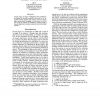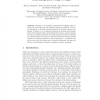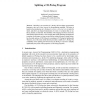143
click to vote
KCAP
2011
ACM
14 years 4 months ago
2011
ACM
Some supervised-learning algorithms can make effective use of domain knowledge in addition to the input-output pairs commonly used in machine learning. However, formulating this a...
143
click to vote
AMAI
2008
Springer
15 years 2 months ago
2008
Springer
We introduce a knowledge representation language AC(C) extending the syntax and semantics of ASP and CR-Prolog, give some examples of its use, and present an algorithm, ACsolver, ...
AAAI
1998
15 years 3 months ago
1998
Deonticlogic, the logic of obligations andpermissions, is plagued by several paradoxes that have to be understood before deontic logic can be used as a knowledge representation la...
167
click to vote
DILS
2008
Springer
15 years 3 months ago
2008
Springer
With over 80 file formats to represent various chemical attributes, the conversion between one format and another is invariably lossy due to informal specifications. In contrast, t...
125
click to vote
AAAI
2008
15 years 4 months ago
2008
One way to solve the knowledge acquisition bottleneck is to have ways to translate natural language sentences and discourses to a formal knowledge representation language, especia...
120
click to vote
ECAI
1994
Springer
15 years 6 months ago
1994
Springer
Abstract. Many recent works point out that there are several possibilities of assigning a meaning to a concept definition containing some sort of recursion. In this paper, we argue...
113
click to vote
CAISE
2004
Springer
15 years 7 months ago
2004
Springer
Abstract. ID-Logic is a knowledge representation language that extends first-order logic with non-monotone inductive definitions. This paper introduces an ID-Logic based framewor...
103
click to vote
LPNMR
2009
Springer
15 years 8 months ago
2009
Springer
CR-Prolog is an extension of A-Prolog, the knowledge representation language at the core of the Answer Set Programming paradigm. CR-Prolog is



